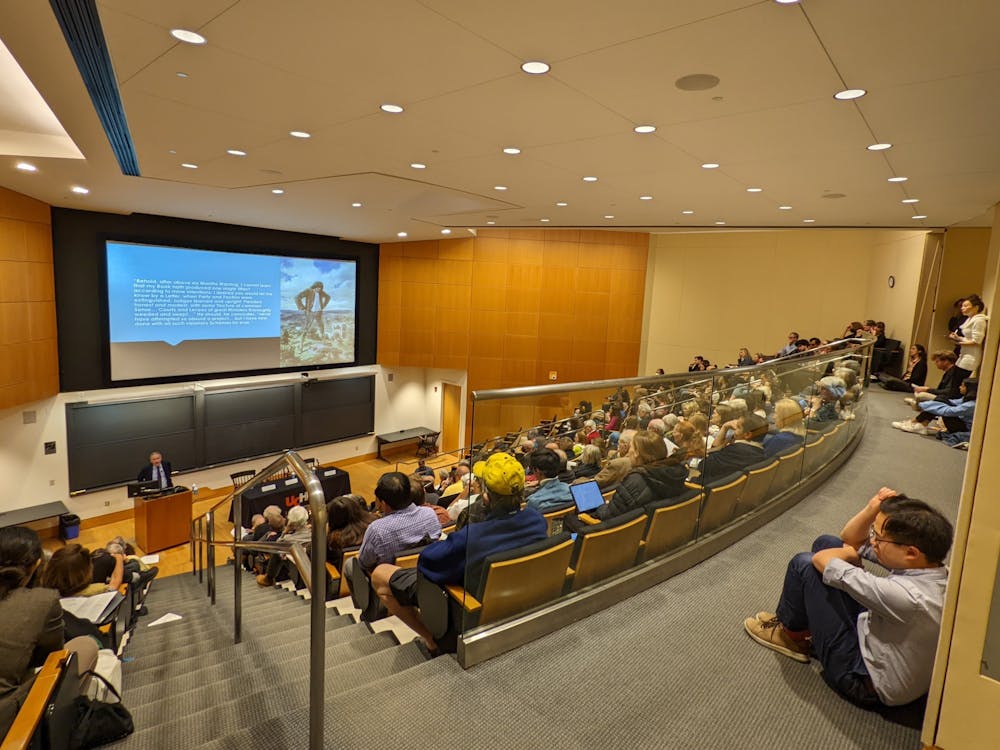Content warning: This piece contains mention of gun violence.
Fintan O’Toole, an Irish Times columnist and the Leonard L. Milberg ’53 Visiting Professor in Irish Letters, presented his talk “Against Artfulness” on Wednesday, Nov. 9, at an event organized by the Tanner Lectures on Human Values. O’Toole discussed how aestheticized politics, or the use of artistic tools to further political gains, has contributed to the democratic backsliding of Western countries in the 21st century.
O’Toole’s presentation was followed by two presentations from University of Pennsylvania history and art professor Gwendolyn DuBois Shaw, and Wendy Brown, the UPS Foundation Professor in the School of Social Science at the Institute for Advanced Study (IAS).
O’Toole opened his talk by observing that, despite the democratization of art and image-making in the digital age, the effects of these aesthetic processes “are not necessarily good for democracy.”
His argument is built on Walter Benjamin’s 1935 articulation of the dangers of aestheticized politics, which, as summarized by O’Toole, asserts that “the more political life resembles art, the more fascistic it becomes.”
To illustrate this, O’Toole presented what he considers “the final stage of the aestheticization of politics,” wherein political players seek to invalidate the horrors of real-life atrocities by accusing them of being fictitious art. He noted the surfacing of footage of children being separated from their parents at the border in 2018 and Ann Coulter’s dismissal of their plight when she called them “child actors.” A similarly false accusation has been lobbied at victims of school mass shootings.
O’Toole argued that the positioning of tragedies into a theater box, where victims are actors and where nightmarish scenarios are staged, is the kind of Orwellian aestheticized politics that endangers the very meaning of truth.
“What you see did not happen. It was all an act. Everything is art,” O’Toole said.
O’Toole continued his talk by focusing on the “five essential tools of art,” which he said, “have been colonized by the political realm.”
In particular, he introduced the ability of visionary artists to induce suspensions of disbelief, citing the talented novelists who encourage an expansion of imagination with their works. In present-day politics, however, O’Toole asserted that this tool is being manipulated by populist politicians such as Donald Trump and Boris Johnson to deceive significant portions of the population.
“To not disbelieve is not at all the same psychological condition as to believe,” he said. “Did Trump supporters believe he was actually going to build a wall around the entire Southern border or bring back the coal mines to Appalachia? Mostly not. They chose, rather, to not disbelieve. The suspension of disbelief is no longer used to broaden one’s mind, but to narrow it,” O’Toole asserted.
O’Toole also articulated how the age of television and social media has incentivized political candidates to project a sincere, likeable persona. To the media-savvy populace, however, this presentation is increasingly scrutinized as a form of manufactured authenticity. Moreover, O’Toole noted that this phenomenon can backfire on politicians and lead to dangerous consequences.

“I think that large numbers of citizens in democracies have concluded that since all politicians present fictionally sincere versions of themselves, the ones who lie most openly, must have been the most authentic,” he explained. Since every politician is marked a liar, “the one who lies least artfully must be the most sincere.”
This gives permission for “the bawling demagogues” to project their transgressions, since, according to O’Toole, “the louder the bawling, the more authentic it’s taken.”
Following his presentation, art historian Gwendolyn DuBois Shaw took the stage to discuss how she reconciled her professional duties for preserving artworks with her passion for social justice in the context of the removal of Confederate statues and the recent controversial protests by climate activists involving pieces of art.
The discussion concluded with political theorist Wendy Brown’s response to O’Toole’s discussion of the fascistic potential of art. Brown demonstrated the revolutionary potential of art by highlighting the use of the song “Baraye” in rallying support for Iran’s “Woman, Life, Liberty” protest movement.
The event took place on Nov. 9 at 4:30 p.m. in the Friend Center. It marked the first part of two events featuring O’Toole and his commentary on aestheticized politics, with the second held on Thursday, Nov. 10.
Correction: A previous version of this article claimed that Walter Benjamin first defined aestheticized politics in 1968. In fact, Benjamin did so in 1935, before he died in 1940. The ‘Prince’ regrets this error.Ngan Chiem is a senior writer at the ‘Prince.’
Please send correction requests to corrections@dailyprincetonian.com.








